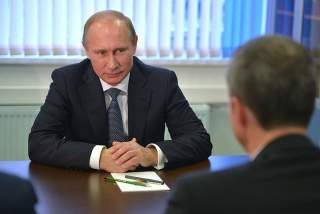Dealing with Putin
The stage is being set for an even more dramatic confrontation between the West and Russia over Ukraine. Obama must recognize the danger to U.S. national interests that the crisis may create and act accordingly.
-reaffirming Ukraine’s non-NATO membership.
Unfortunately, while the fundamentals of a successful agreement are well understood, it is far more difficult to reach such a deal in practice than in theory. Two big problems regarding the Ukraine crisis are the extent to which both sides mistrust one another and the Obama administration’s apparent lack of interest in investing any real political capital in seeking a solution in Ukraine. As with many aspects of the Obama foreign policy, the White House appears reluctant to deploy political capital in controversial but potentially effective actions. A realistic and lasting solution would have to reflect the national interests and protect the dignity of both sides, including President Putin, yet most in Washington want to treat Putin as if he were Slobodan Milosevic, Saddam Hussein or Muammar Gaddafi.
Secretary of State John Kerry appears vainly to hope that his not-so-special relationship with Russian Foreign Minister Sergey Lavrov will somehow produce a solution to the Ukraine crisis. In the wake of Russia’s apparently refusal to attend the 2015 Nuclear Security Summit and its rejection of intelligence sharing to counter ISIL, it should be clear that this cannot succeed. Under the circumstances, there is no responsible alternative to attempting to open a private channel to Putin and trying to end the U.S.-Russian confrontation over Ukraine before it gets completely out of control. Our candidates for that task are the team of Henry Kissinger and White House Counselor to the President John Podesta who just demonstrated his diplomatic skills in dealing with Beijing—but for them or anyone else to have a chance, President Obama must first recognize the peril to U.S. vital national interests that the crisis in Ukraine may create during his remaining years in office and beyond, and to act accordingly.
Robert D. Blackwill is the Henry A. Kissinger Senior Fellow for U.S. Foreign Policy at the Council on Foreign Relations (CFR). He has also served as Deputy National Security Advisor for Strategic Planning under President George W. Bush as well as U.S. Ambassador to India.
Dimitri K. Simes is President of the Center for the National Interest, a position he was appointed to by the center's founder Richard M. Nixon.
Image: The Kremlin.

